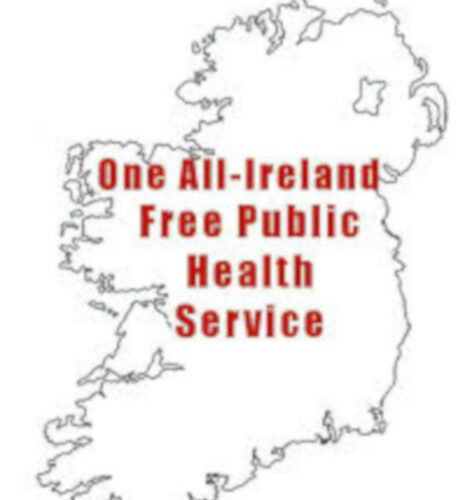Professor Geraldine McCarthy, chairperson of the board of the South and South-West Hospital Group, has become the third senior health figure to resign, following the departure of two other senior officials from the government’s Sláintecare reform scheme. The three lay the blame on the government’s continuing failure to implement reforms in the health service.
Sláintecare is just another smokescreen created by the government to give the illusion that they are serious about solving the health crisis. They are not. Sláintecare has already given up the ideal of universality, with instead an emphasis on expanded eligibility and with no clear plan for the future of health provision outside the market.
Meanwhile Denis O’Brien continues to reap the benefits of the crisis and is expanding his Beacon Private Hospital. With 46 per cent of citizens now turning to private health insurance, the health crisis is a bonanza for insurance companies.
North of the border, the once-mighty National Health Service is on its knees, the worst-performing region of this service. It is impossible to get figures for private health insurance in the North, but 10½ per cent of people in Britain have private health insurance. They are abandoning the NHS in droves while it continues to be underfunded, privatised and dismantled by successive British governments.
The service in the North, though free at the point of entry, is worse than south of the border, with longer waiting-lists and waiting-times per capita. For example, for a simple cataract removal you wait four years in the North and three years in the South, though you can have it done privately in a matter of weeks in either jurisdiction, and often in a public hospital.
Covid-19 didn’t cause the crisis in the health service: it exposed it. Despite the valiant efforts by our underpaid and overworked health workers, north and south, neither health service was capable of dealing with the pandemic. Large sections of both systems were shut down to cope with covid-19.
Before the pandemic, both health systems were already at breaking point, with the longest hospital waiting lists in Europe. In Ireland there are more than a million people on hospital waiting-lists: 327,000 for the NHS and slightly less per capita, at 830,000, for the HSE.
The only equality in the health systems is equality of health deprivation, with the two systems having similar numbers of people on waiting-lists. More than one in every six people, north and south, are on a hospital waiting-list.
A hundred years after partition we have two dysfunctional health services, unfitted for the needs of the people of Ireland. The pandemic demonstrated that disease knows no borders, be they physical or economic. The lunacy of two health strategies in Ireland, with its two health services, has resulted in the death rate from covid-19 in the North being twice that in the South, with hundreds of unnecessary deaths.
The introduction of vaccination in the North was at first very efficient and much faster, but then it stalled. This threatens to undo all the good work in the South thanks to the slow-down in vaccination and north of the border to low take-up rates among some sections of the population. Two health strategies for a place the size of Ireland is chaotic and not good enough. It is literally killing us.
Instead of two contradictory strategies we could have had one all-Ireland zero-covid strategy, similar to that of New Zealand, which would have saved thousands of lives, north and south, and stopped hundreds of thousands of people from being infected in the first place. This is the real potential of an all-Ireland public health service.
Partition has done nothing to advance health services. Covid-19 does not recognise the border, and neither should the health service; but neoliberal governments recognise the potential for private business interests.
In the North, in the five years before the pandemic 22,000 people died while waiting for a hospital appointment. Waiting-lists are a hundred times longer in the North than those in England.
In the South the two-tier health system goes from one crisis to another, with the national scandal of people on trolleys in A&E departments waiting for admission. Many are seriously ill or even dying, forced to spend the last few hours of their life on a trolley in a public corridor, with no privacy, stripped of their dignity in their final moments of life in the middle of the chaos that is our A&E departments.
Added to this, both health services are faced with the huge backlog of care caused by covid-19.
We need one all-Ireland fully funded, publicly owned and managed health service, free at the point of entry, from the cradle to the grave, from creche to care home—not the cobbling together of two failed systems.
If health was something money could buy, only the rich would live, and the poor would die.






